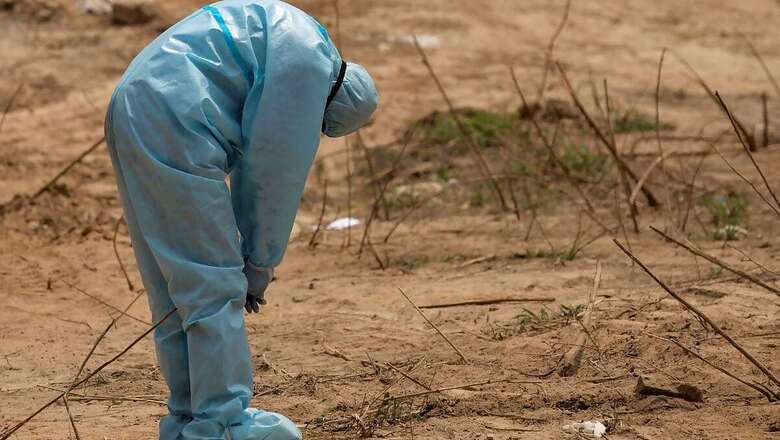
views
Covid-19 has impacted people’s physical and mental health in varying degrees, apart from the economy and other components of growth and development. Various studies conducted by the Brain Behaviour Research Foundation of India, Mental Health America and case studies of Covid-19 patient Professor Mujibur Rehman and Yogesh Bandhu, who works with the World Bank, speak volumes about the effect of this disease on mental health.
Rehman who is an assistant professor at the Centre for the Study of Social Exclusion and Inclusive Policy at Jamia Millia Islamia University in New Delhi, shared his experience after he was discharged from the hospital. “It was a life-changing experience. I was in an unconscious state for the first three days. On the fourth day, I started feeling a bit normal. After I came back from hospital, I felt anxiety and was depressed as well. One tendency I had developed was that I wanted to finish everything, including my food, in a hurry. The most unusual thing about my weakness is that there is an unusual and erratic pattern where suddenly I feel very weak. I have to lie down for some time. I feel like I have come out of seven days of hunger. At any point of time I can feel uncomfortable and it is unpredictable. After my treatment I have lost my concentration. Earlier, I used to read for 7 to 8 hours but now I cannot even concentrate for more than 30 minutes,” he says.
The professor terms it a lifetime experience for me which will stay for long in his subconscious mind. “This experience will definitely change my life, the way I look at myself and other things around. In the first three-four days, I was not sure if I was going to live. I was worried because I had a lot to do in my life. It was an entirely different experience because it was my first hospitalisation,” Rehman says.
However, it would be wrong to presume that every Covid-19 patient will have a mental health problem as the degree and complication may vary from case to case. Bandhu, who is a social scientist and currently working with the World Bank, had a very different experience compared to Rehman. “Initially I had mild symptoms and I had self-quarantined at home. But when things got complicated I had to take medical treatment from hospital while staying at home. They had a package to get treatment from home. At one point of time I was very worried and frightened that I would not survive, but things improved gradually. All throughout, I had some stress and anxiety but I tried to be strong, and proper diagnosis and treatment finally saved me. Right now, I don’t have any post-Covid complications other than joint pain and weakness at times,” he said.
The Brain Behaviour Research Foundation of India (BBRFI, www.bbrfi.org) under the chairpersonship of Dr Meena Mishra, has been constantly offering its support through specialised psychological services during the pandemic. Being a research institute, it has conducted various studies related to the psychosocial impact of the pandemic. One of its reviews conducted by Subodh Kumar, deputy director, and Divye Kartikey, an intern at BBRFI, which is currently in publication, delves into the psychosocial impact of Covid-19.
“The finding of this review concludes that as we are moving into subsequent phases of the Covid-19 pandemic, we are witnessing a rise in mental health problems among people. The Covid pandemic has caught everyone psychologically unprepared. Our vulnerability stems from our nature of overdependence on external things and at the same time we are loss aversive; that is a perfect recipe for anxiety and depression. Losses incurred by people during the pandemic have exposed this vulnerability. The loss of life and jobs during the lockdown and severe isolation measures imposed by governments have been traumatic to the psyche of people due to which now many have the fear of getting tests done and or divulging the results to authorities,” said Dr Mishra.
The tendency of the human mind is to act irrationally in the disguise of rationality and intelligence, she argued. “Rather than believing in science, the fear of uncertainty drove many to believe in fake news and conspiracy theories, and to act on them. It also stems from frustration sparked by prolonged social limitations and loneliness. Anxiety, panic, depression and increased suicidal tendencies are continuously on the rise. There have been social implications like increase in domestic abuse, child abuse and elderly abuse due to ‘work from home’ and the lockdown,” Dr Mishra said.
According to the latest findings of Mental Health America (MHA)’s online screening programme, the number of people looking for help with anxiety and depression has skyrocketed.
Important findings of the programme are: from January to September 2020, a total of 315,220 people took the anxiety screening, a 93 per cent increase over 2019. 534,784 people took the depression screening, a 62 per cent rise over last year.
The number of people screening with moderate to severe symptoms of depression and anxiety has continued to increase throughout 2020 and remains higher than rates prior to Covid-19. In September 2020, the rate of moderate to severe anxiety peaked, with over 8 in 10 people who took an anxiety screening, scoring with moderate to severe symptoms. Over 8 in 10 people who took a depression screening have scored with symptoms of moderate to severe depression consistently since the beginning of the pandemic in March 2020.
More people are reporting frequent thoughts of suicide and self-harm than have ever been recorded in the screening programme since its launch in 2014. Since the pandemic began to spread rapidly in March 2020, over 178,000 people have reported frequent suicidal ideation. 37 per cent of people reported having thoughts of suicide more than half or nearly every day in September 2020.
Young people are struggling the most with their mental health. The proportion of people in the 11-17 age group who accessed screening was 9 per cent higher than the average in 2019. Not only are the numbers of youth searching for help with their mental health increasing, but throughout the Covid-19 pandemic, 11-17-year-olds have been more likely than any other age group to score for moderate to severe symptoms of anxiety and depression.
(The author is a freelance journalist. Views expressed are personal.)
Read all the Latest News, Breaking News and Coronavirus News here














Comments
0 comment